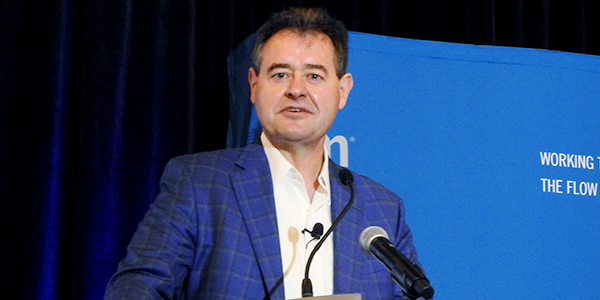By Christen Smith
PJM’s state advocates and regulators want the organization to focus on external candidates as it continues the search for a new CEO — someone capable of prioritizing policy goals above “comity” with neighboring RTOs and ISOs.
Leaders from the Organization of PJM States Inc., the New Jersey Board of Public Utilities, the Consumer Advocates of the PJM States, and attorneys general from Delaware, Maryland and D.C. sent letters last week to the head of the RTO’s search committee, Board of Managers member Neil Smith, detailing what qualities former CEO Andy Ott’s replacement should possess. (See PJM CEO Andy Ott to Retire.)
Ott announced his retirement effective June 30 after two decades with the RTO, during which time he helped launch the wholesale energy market and navigated the fallout of the GreenHat Energy default, the latter of which he described as one of his greatest challenges.
Interim CEO Susan J. Riley said last week she expects to be around “about four months” while the search committee picks a new leader — and everyone, whether inside PJM or not, is on the table.
Some stakeholders hope it’s the latter of those two categories, however.
Aside from an economic and policy background and commitment to ushering in a cleaner power grid, CAPS President Kristin Munsch said the new CEO should want to work with states’ environmental goals — not against — and build a stronger partnership with the Independent Market Monitor.
“Just as PJM recognizes the rights of states to their policies, PJM must recognize the right of the IMM to be an independent body,” she said. “Arguments parsing Tariff language distract from the larger questions of how to use competitive markets to provide affordable and reliable electricity service.”
Acknowledging the necessity for PJM “to constructively work” across its seams on the “shared mission of reliability, New Jersey BPU President Joseph Fiordaliso also contended that “PJM management too often elevates a desire for comity with its sister ISOs and RTOs over representing the public interests of its own constituent states.
“This issue is particularly important to states like New Jersey, which sit directly on the seam between PJM and the New York Independent System Operator, and which have been responsible for fully one-third of all PJM transmission costs allocated over the past 15 years,” Fiordaliso said.
He said stymying climate change must be top of mind for PJM’s new leader as the RTO stands at the precipice of “tectonic shifts in their mission.”
Fiordaliso said an outside candidate could serve as a “fair and neutral arbitrator” among stakeholders, noting that leaders from other RTOs and ISOs should be avoided because “the management of those organizations have struggled to balance the oft conflicting views of state and federal regulators.”
“In a more tangible sense, we recommend that the search committee work to identify candidates capable of driving two (sometimes conflicting) policy agendas at the same time,” he said. “This experience will ensure PJM’s best-in-class management of today’s electric grid and vigorous planning for the needs of tomorrow’s electric grid.”
The attorneys general agree that supporting grid innovation that complements aggressive climate change policies adopted in some PJM states will be a key focus for the new CEO.
“PJM’s president should also have the economic and policy background to understand that state clean energy preferences are not out-of-market distortions to PJM interstate markets, but instead are important market corrections,” the officials said in their joint letters. “These policies address pressing environmental externalities and will modernize our state economies, creating jobs as well as environmental benefits.”
Smith instructed PJM members to submit all recommended candidates to the committee no later than July 19.




